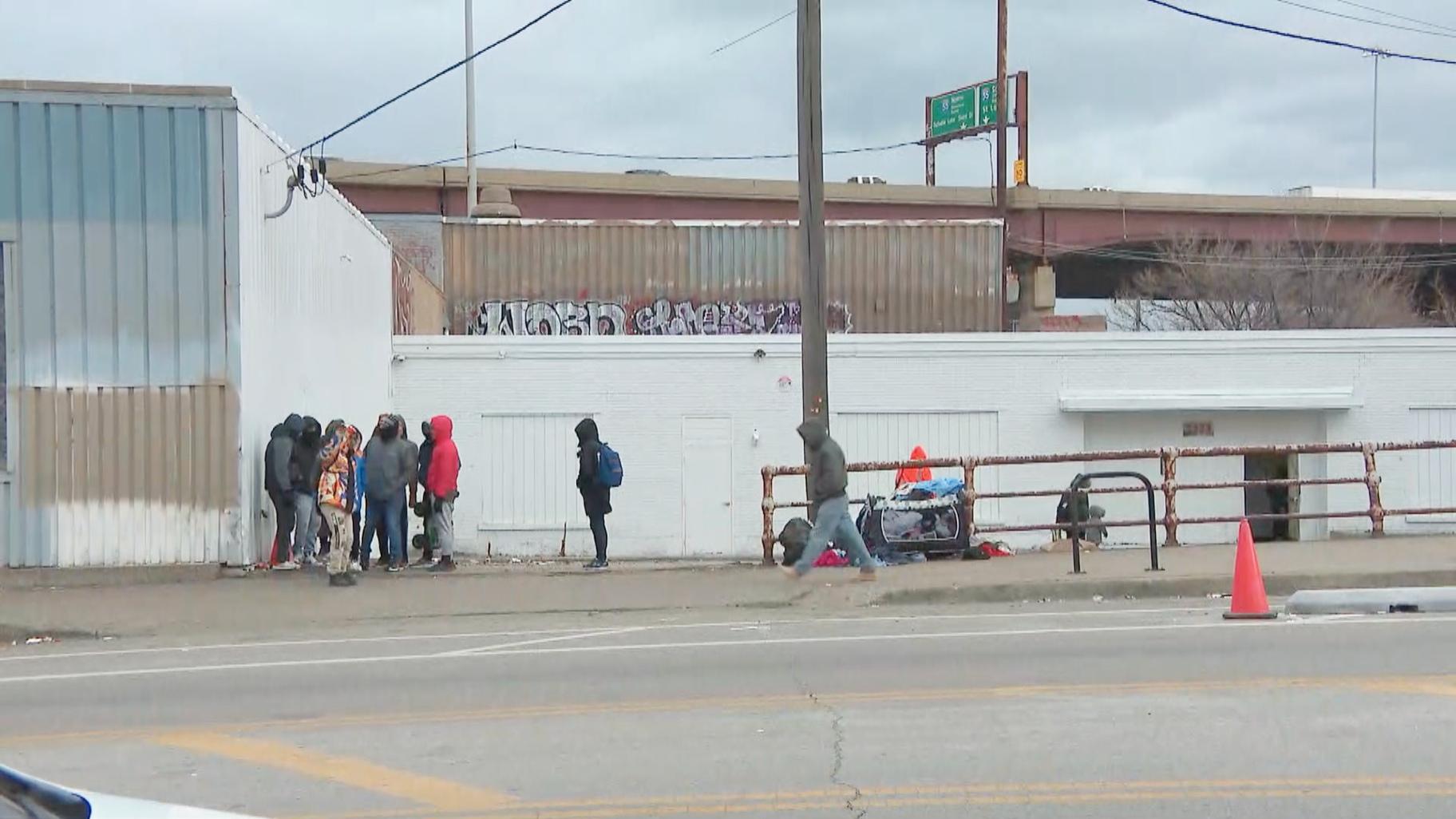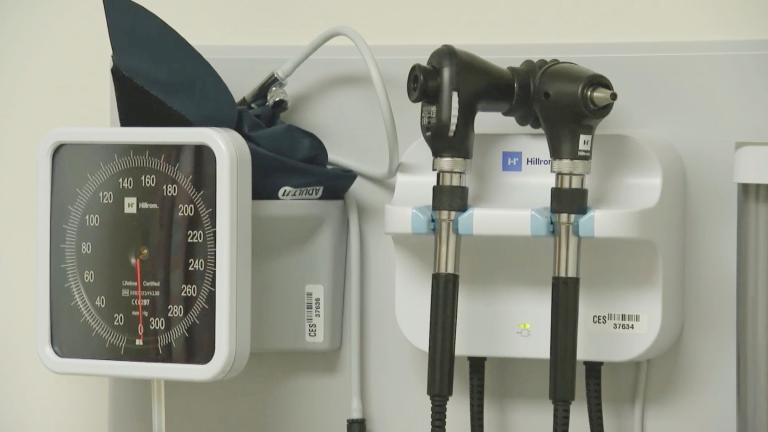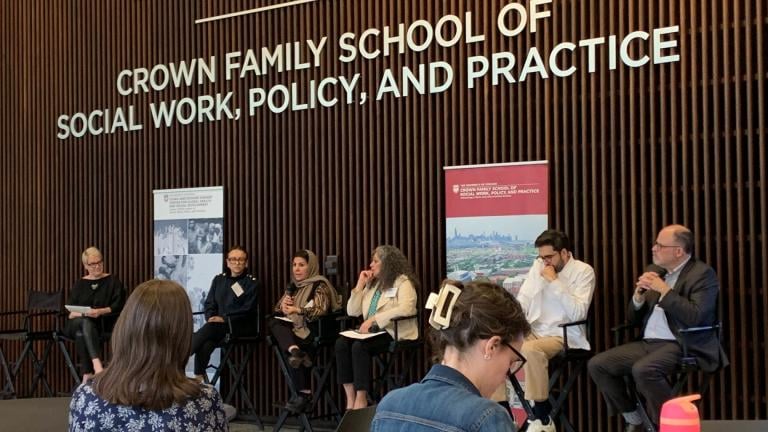 A migrant shelter located at 2241 S. Halsted Street. (WTTW News)
A migrant shelter located at 2241 S. Halsted Street. (WTTW News)
The inflow of migrants that’s stressing city resources also appears to be straining Chicago’s relationship with the state, as Gov. J.B. Pritzker on Monday criticized Mayor Brandon Johnson’s plan to stop expanding shelter space. In turn, the mayor hinted that Illinois could be doing more.
Pritzker said he’s “deeply concerned” that Chicago is not going to add bed space, as the flow of nearly 35,000 asylum seekers who’ve come to the city since August 2022 shows no signs of abating.
“We do not have enough shelter as it is in the city of Chicago,” Pritzker said at an unrelated press availability. “We need to make sure that we’re not ending shelter capacity, as the city is now planning to do, at the end of winter. If you think this problem is going to end when the temperature warms up, it’s not. We still need shelter for people.”
Pritzker did not offer additional state money for shelter expansion, and when explicitly asked Monday whether the state will come forward with additional funding for Chicago, he instead focused on the need for the legislature to backfill millions already spent.
In a statement, Johnson spokesman Ronnie Reese indicated that if Pritzker’s so concerned, he could pull the levers at his disposal as the state’s chief executive.
“There are 1,300 municipalities in the State of Illinois, of which Chicago is one. The State has the authority to fund, stand up and operate a shelter in any one of those municipalities at any time that it chooses, including the City of Chicago,” Reese wrote. “Thus far, the City of Chicago has carried the entire weight of the new arrival mission, sheltering nearly every asylum seeker sent to Illinois. We remain committed, however, to ensuring that asylum seekers are housed while also fulfilling our fiduciary responsibilities to the people of Chicago.”
A Pritzker official said that Illinois has taken on responsibilities ranging from wraparound supports to six months of paying for food in shelters, plus allocating the majority of grant funding to Chicago.
“The idea that they are shouldering all of this on their own is ridiculous,” the official said.
The official also pushed back that the state has the authority to build a shelter anywhere it pleases.
With winter weather advisories in effect, about 200 people Monday were waiting in Chicago for a shelter bed.
Shelter space may open come Feb. 1, under a controversial joint city/state plan that calls for migrants to be evicted from shelters after 60-day stays.
The evictions have twice been delayed due to snows storms and single-digit temperatures, but according to city data, nearly 3,000 migrants could be pushed out of shelters within the first couple days of the policy taking effect.
But it’s unclear whether those individuals and families will have anywhere to go, and as more Latin American migrants are bused into Chicago from Texas, open shelter beds aren’t expected to stay empty long.
It’s expected that Texas Gov. Greg Abbott, a Republican who is purposefully sending migrants to Chicago, will ramp up his efforts leading up to the Chicago-hosted Democratic National Convention in August.
WTTW News reported last week that city officials have no plans to open new shelters or to add beds to the 28 existing shelters, and the Sun-Times reported in mid-January that the Johnson administration was going to “rightsize” its shelter capacity because of limited funding – a term that could indicate not just standing pat, but reducing capacity.
The Johnson administration had apparently been planning as far back as late December to stop adding capacity.
The Politico Illinois newsletter reports that alderpersons were given a memo when they were briefed on the plan on Friday. According to that memo, “as of 12/22/23 the City does not plan to add shelter beds and will fill beds as residents exit.”
The governor on Monday also balked at the city for not being more upfront with his administration about its plans and needs.
“The city has not said where they would like us to put our resources to build new shelters or help them build new shelters, so we can’t help if they don't identify those locations,” he said.
Pritzker in early December pulled the plug on Johnson’s idea to build a winterized base camp in Brighton Park, after construction had already begun. The governor citied “serious environmental concerns” following an environmental assessment of the city, which had for decades been in industrial use.
Chicago’s budget allocates $150 million to care for migrants – a figure that Johnson was up front about as less than what officials expect to spend this year.
Illinois taxpayers, meanwhile, invested at least $648 million on response to the asylum-seeker crisis, including $160 million announced in November — $65 million of which is allocated or shelters, with the rest going toward caseworkers and support and for an intake center in Chicago that state officials project will be completed this month.
The first state-funded shelter, on a former CVS lot in Little Village, opened Jan. 11 and has room for 220 people.
Pritkzer pulled the $160 million from the Illinois Department of Human Services’ existing budget, and has repeatedly said he hopes that lawmakers will vote to backfill the money.
“We’ve already made a decision at the state level that we are investing in taking care of, in this humanitarian crisis, the people who are arriving,” Pritzker said about that pot of funding.
When Pritzker announced the $160 million infusion, the state also halved how much it would provide in rental assistance for migrants once they’ve moved out of shelters, reducing that assistance from six to three months.
The Illinois General Assembly’s session resumed last week, though there is no indication of when lawmakers may vote on that request.
It stands to be a difficult vote, with legislators reticent to move on a standalone spending measure for migrants given myriad other concerns that could use cash.
Johnson was set to meet Monday afternoon with mayors from the surrounding metropolitan area, where migrants have been sent after Chicago cited and fined bus companies for making drop-offs outside of hours specified in a new city ordinance.
Handfuls of suburbs have since passed measures of their own attempting to restrict migrant drop-offs.
The governor said as the legislative session gets underway, members of the General Assembly are considering how to take a coordinated approach, but he offered no indication of what that may be.
A Texas bus company, Wynne Transportation, alleges Chicago’s penalties are an unconstitutional breach of the interstate commerce clause.
Both the mayor and governor have continually called on Biden and Congress to address the situation in a fulsome capacity, both by having a national point person appointed to help coordinate what happens to migrants after they cross the border, and by sending more money to states bearing the biggest burdens of the influx.
WTTW News reporter Heather Cherone contributed.
Follow Amanda Vinicky on Twitter: @AmandaVinicky








